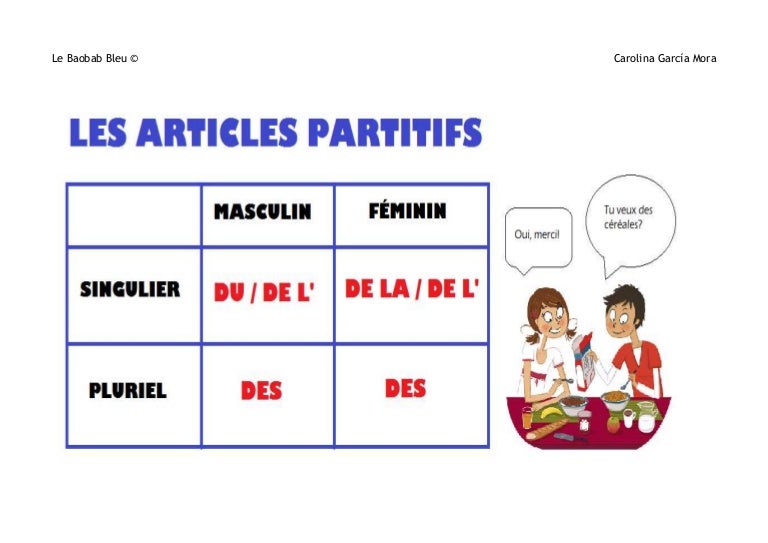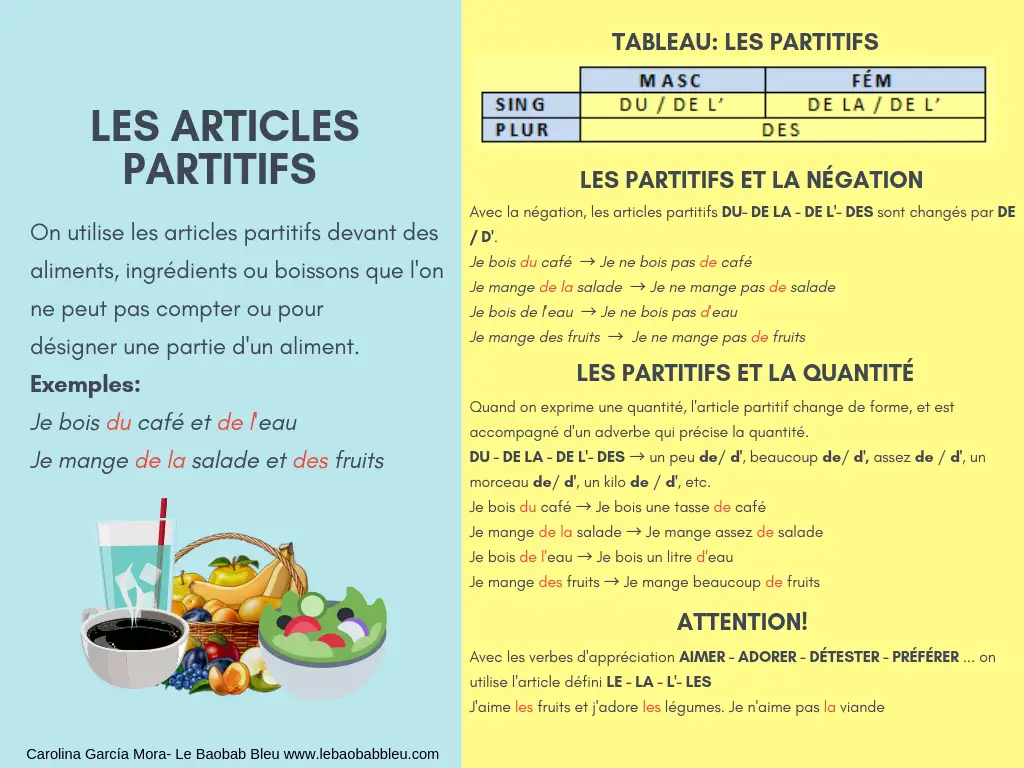
PPT Les articles indéfinis et définis, l’article partitif PowerPoint
Les partitifs. You are already familiar with the definite articles (le, la, les) and indefinite articles (un, une, des).Now we will look at a third kind of article called partitives. These are formed by combining the preposition de with a singular definite article: du, de la, de l', des.Partitive articles indicate an unspecified quantity of a noun (nouns that normally cannot be counted, like.

Les articles partitifs
In general, there is no equivalent in English. They are a combination of de + a definite article and there are four partitive articles : Du (=de le) is used for masculine words. De la for feminine. De l' for words starting with a vowel or a silent H. Des (de les) for plural words. In general, we use them for talking about food, sports with.

Les Articles Partitifs
Suchita Gupta, from https://www.learnfrenchbysuchita.com, teaches you les articles partitifs (The partitive articles) in French.| For Classes : +91-89200604.

French For Me And You ادوات التجزئة les articles partitifs Du,De la
In French, the partitive articles du, de la, de l' and des can all be used to give information about the amount or quantity of a particular thing, depending on whether the noun is masculine or feminine, singular or plural. They are often translated into English as some or any. with masculine noun. with feminine noun. Singular.

Français IES Picasso Les articles partitifs
In French, the partitive article is formed with de ('of') and the. definite article. ('the'.) This table shows how the combination works: masculine. feminine. before a vowel or silent h.

PPT LES ARTICLES PARTITIFS PowerPoint Presentation, free download
Le nom qui suit l'article partitif désigne généralement quelque chose d'inanimé (ex. : du sable). S'il désigne un animal, il transforme celui-ci en matière consommable. (ex. : Un bœuf / du bœuf) ️ Au singulier : - devant un nom masculin commençant par une consonne -> du / de / d' (devant un "h" muet) du fromage de l'emmental

Ejercicio de Les articles partitifs Worksheets, Answers, Remember
On utilise des articles partitifs pour exprimer des quantités indéterminées et non comptables ou non quantifiables (comme du liquide ou de la poudre). Les articles partitifs indiquent une partie des aliments que l'on partage (comme le pain, les légumes…) Formation De + article défini Non-comptable

Les Articles Partitifs Exercices Et Corrigé sauce Soupe
While the indefinite article ( un, une, des) is used with countable quantities (un oeuf, deux oeufs.), the partitive article is used before mass nouns, nouns that are indivisible or uncountable. In English the article 'some' is often omitted.

Articles partitifs YouTube
The partitive article refers to an unspecified quantity of food, liquid, or some other uncountable noun. English has no equivalent article - the partitive is usually translated by the adjectives "some" or "any," or may be left out entirely. Par exemple… Characteristics of partitive articles

1º LES ARTICLES PARTITIFS Le Baobab Bleu
L'article partitif est un article indéfini en français qui sert à désigner une partie indéterminée d'un tout ou d'une quantité indéterminée de quelque chose. Abonnements Connexion S'inscrire.. Ces articles vont vous intéresser… Les 40 règles de base de l'orthographe française;

Différence entre articles définis contractés et articles partitifs un
We use partitive articles before a concrete or abstract noun that we cannot count. For example: "Je mange une pomme ou je mange deux pommes." (I eat an apple or I eat two apples) I can count the apples: 1 or 2. But I say: "Je mange du riz" (I eat some rice) I cannot count the rice on my plate, there is too much rice.

Les articles partitifs et les aliments YouTube
There are four types of partitive article in French, du, de la, de l', and des, used to specify unknown quantities. These correspond to 'some' or 'any', which are often omitted in English. Choosing which one to use depends on the gender, number and first letter of the noun that follows. - Qu'est-ce que vous voulez manger ?

exerciceslesarticlespartitifs.pdf
You've learned to use the definite articles ( le, la, l', les) and the indefinite articles ( un, une, des ), but French also has a third type of article : the partitive article ( du, de la, de l') ! As you'll learn in this lesson, the partitive articles have different uses ! 1) The basic rules

El Conde. fr Les articles partitifs
How To Use Partitive Articles in French. As you can see from the examples above, when we want to translate "some", using a partitive article is easy. All you need to do is choose the correct form according to whether the noun is masculine, feminine or plural. However, sometimes English uses a noun alone - without an article or "some.

Les articles partitifs Artofit
The French definite articles (articles définis) are le in the masculine singular, la in the feminine singular, l' for singular nouns that start with a vowel, and les in the plural (both genders). They correspond to the English article the. We use the definite article in the following cases: to talk about a specific person or thing.

Les articles partitifs Artofit
The video below will teach you how to use partitive articles (du, de la, de l ', des) in French in front of nouns of foods to express an undetermined quantity: Integrated YouTube video. Note: This integrated video is provided by YouTube, LLC, 901 Cherry Ave., San Bruno, California 94066, USA. When playing a connection to the servers of.